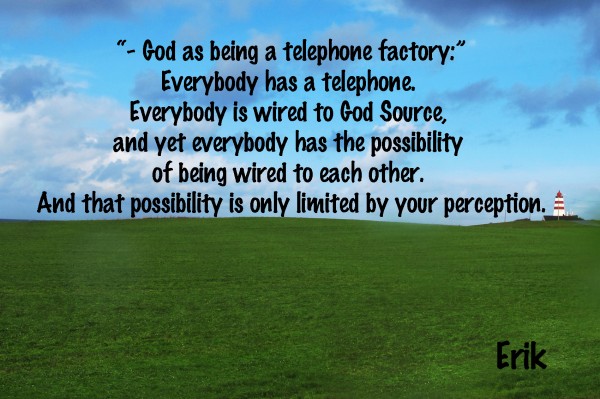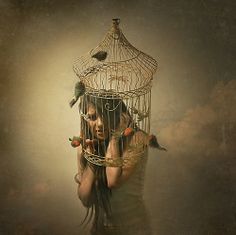I hope you all had a wonderful weekend! We spent both days decorating the inside of our house. (It looks like Santa threw up in it.) We also put lights in the trees outside, so it’s very Christmassy.
As for the results of the poll: Most of you want me to channel Abraham Lincoln. There are so many questions to ask him: His relationship with his (difficult) wife, his sexual orientation (which is in question,) and much more.
The majority of you also want me to continue posting 5 days a week, so I guess you won’t tire of it or have problems keeping up!
Here’s today’s post. I’ve included the poem I posted before in case you don’t remember what is basically the flow of the human condition.
Uncertainty is the root of fear
Distrust is the root of uncertainty
Scarcity is the root of distrust
Hostility is the root of scarcity
Sorrow is the root of hostility
Attachment is the root of sorrow
Fear is the root of attachment
Chaos is the root of all
Harmony is the equal opposite of chaos
Emotional Resilience
Me: Where does the uncertainty fit in?
Erik: When you don’t have emotional resiliency, you don’t have faith that you can “get through this.” Uncertainty is ultimately about not be able to see far enough ahead. You’re walking around in the dark, and because you don’t know what the room was like when it was lit, you have no fucking idea what direction to go in. So you take these tiny little steps and cringe and go, (in a scared little voice) “Oh, am I going to run into something?” A lack of emotional resilience is not being able to see that everything is a process to help us evolve so that, from a logical perspective, we can figure out how to solve the problems and, from an emotional perspective, we can become aware of how we’re feeling and how we’re working through those problems on an emotional level. You can handle anything. The only reason people end up breaking down is because they never give themselves a chance to see that.
Me: How can they allow themselves to see that?
Erik: It’s different for everyone.
He shows an image of a person getting covered by one blanket, then another, then another.
Erik: These blankets represent different experiences, emotional or otherwise. You have to learn how to take off these blankets one at a time. This is a metaphor for letting go of those experiences. You do that by taking small steps. Let’s say you’re afraid to leave your house. You’re trapped there because you have agoraphobia. Start with opening a window. Look outside, and see everybody walking up and down the street. Then, walk out on your front porch and stand there for a few minutes. Whenever you start to feel overwhelmed, go back in the house. Don’t let it get to the point of just piling more blankets on. Then, you go out and try to stay outside longer and longer. When you don’t rush things, you don’t pile another blanket on and you learn to bounce back from pain.
Me: What about in my case?
Erik: Mom, you’re life has been about piling on one blanket after another starting with your childhood abuse to my death. Let’s talk about why you wanted a family.
Me: Okay.
Erik: Your pattern is to work from the outside hoping that it will work its way back to the inside. You try to heal external things hoping that it will come back and heal you.
Me: So true.
Erik: That’s one of the reasons you wanted a family. You wanted to give your kids the fairytale childhood that you never had.
Me: Yes. I thought that would heal me.
Erik: Exactly, but it doesn’t really work that way.
Me: Tell me about it! It might put a little Band-Aid on it, but…
Erik: It might not heal you, but it’ll give you that awareness that it won’t.
Me: Actually, my expectations set me up for a lot of pain because when it doesn’t work, like when one of my children struggled with various things—
Erik: You look at it as your failure. So once you realize it won’t heal you internally, you become aware of what will. A lot of people go through this. They look for something external to themselves to heal them. It never fucking works.
Me: Yeah. You never learn to bounce back, to have that emotional resilience.
Erik: Right. Think about it. What if that external thing is ripped away from you? Now where are you? My death. My death was a huge wake-up call.
He makes a loud air raid siren sound.
Me (Sadly): Yeah. You were one of my five precious babies who were supposed to mend my heart. When you died, I eventually, and I mean a long time afterwards, saw that you could never heal my childhood wounds.
Erik: You can see that now, but you had too much grief wrapped up in it before.
Erik takes his cap off and scruffs his hair up.
Erik: There are just so many layers to your onion, Mom. In the case of my death, it’s loss of a child and it’s suicide. In our culture, these are such horrific things. They’re so traumatic. So people around you who could have supported you are like, hush-hush. “Oh, let’s not talk about it with her. It’s too horrible. It’ll embarrass her,” or “We don’t dare talk about it because it was her child.” “We don’t dare discuss it because it was a suicide.” You had everything stacked up against you. Not many people could walk you through it.
Me: What does that have to do with my emotional resiliency?
Erik: Oh, cuz no one was around you reminding you to be and allowing you to be a screen instead of a brick wall. They were holding up that brick wall because, you know, “We ain’t gonna talk about that taboo shit.” Not having that kind of support left you with nothing to ground yourself to.
Me: It’s very difficult to grieve in a vacuum.
Erik: Yes. You didn’t have anyone throwing you a lifeline while you were in that emotional pit of grief, and that made it hard for you to bounce back.
Me (Tearing up): I had such hopes to help you create a beautiful life for yourself, and that was taken away from me.
Erik: It was never taken away from you. The life that I had was mine, not yours. But you were so wrapped up in my life, same as with my brother’s and sisters’, that when I died, part of you died, too. The nature of existence is to be constantly changing. It never stays the same for very long. It only ends up hurting us when we stay too attached to the things we don’t want to change.
Me: Yeah. In my case, the attachment to my failure to create that fairytale childhood for my kids and my failure in saving your life has created a lot of suffering.
Erik: But through all of that, you’ve learned that things external to you, which of course you can never completely control, don’t hold the answers to your healing. That’s all within you.
Me: Still, it’s a hard thing to bounce back from even when you have that awareness.
Erik: That’s why people have to rely on other sources of support like family, friends, therapists, etc. They can help support you through this process.
Me: The people who open the windows and hold your hand while you walk out to your porch.
Erik: Right, but choose people who won’t hold you back or force you to move forward at too fast a pace.
Me: So what can we do to become more emotionally resilient? What can you tell a person who’s lost someone and can’t pull themselves out of their grief, for example.
I know it sounds inappropriate, but I can’t get that, “Help! I’ve fallen, and I can’t get up” commercial out of my head.
Erik: The key is communication. Talk about it, and give yourself permission to talk about it 10,000 times.
Me: Just air your feelings?
Erik: Yes.
Me: When I talk about one of my experiences, it makes me more aware of my situation, my feelings, my thoughts and the motivation behind my emotions. It seems like as I talk to someone about it, I reflect on it inwardly at the same time. I don’t know if I’d self-reflect if I didn’t share out loud.
Erik: That’s true, and that brings emotional honesty back into the picture. Emotional self-honesty and emotional resiliency are intertwined. One requires the other. One helps the other grow. When you work on becoming emotionally resilient, you’re requiring emotional honesty of yourself. When you get to that place of self-honesty, it’s easier for you to let those haunting moments pass through you while leaving you unharmed. The spiritual value in learning how to be emotionally honest with yourself and developing emotional resilience is that you become more and more self-aware.
(Long pause as Erik scratches his chin and thinks)
Erik: I know this sounds kind of abstract, but you first need to ask yourself, “Where’s my faith? I obviously don’t have faith in myself or the people around me or the process itself.”
Me: How do you find your faith?
Erik: To have faith, you have to have trust. If you don’t have faith, then there’s something you’re not trusting. One strategy is to look back on your life and see that you have bounced back from your struggles. Everything worked out. It really depends on what you’re not trusting. If you’re not trusting relationships, then you need to pursue them. If you’re not trusting that you can stand on your own two feet, then you need to set yourself up for little wins no matter how small. Peel one blanket off at a time. It’s about facing your fear. Things might feel scary but only because you’re not looking at them. You’re not accepting them. You’re denying them. You’re avoiding them. You’re looking away from those windows and doors. Emotions and experiences that make you feel like shit only do so because they’re begging for acknowledgment and acceptance. Everything wants a resolution and acceptance gives it that. Those things help us become more and more aware of ourselves, Mom, aware of how and who we are. That’s the key to emotional resilience.
Me: But sometimes a person is so damaged and paralyzed by the experience that they can’t go through those abstract steps.
Erik: Yes. Most of the time, when people are hurting, and they can’t be resilient. They sometimes shut down so much that they can’t share their feelings with anyone.
Erik shows the image of somebody prying the lid off a Mason Jar that’s been in a pressure cooker.
Erik: I want to teach the person or the people around them to step up. You can save a person’s life by saying, “I’m not going to leave until you talk to me, and I’m not going to take what you share with me anywhere. I’m going to take it and put it in this little basket, and I’m going to leave it here at your place.
He gives the image of a white and pink Easter basket. Very cute and girlie of him.
Me: I’d say, “Take it! Take it away, please! Give it to the Salvation Army. I don’t want it.”
Erik chuckles.
Erik: We need to teach people to ditch all that taboo shit that our culture has given us and help pry the lid off the jar of the person who’s having such a hard time.
Me: And your support system can help you look inside and be honest with yourself about why you’re on the floor like you are and why you can’t pull yourself up. They can guide you through that process.
Erik: Yes, but sometimes they have to encourage the person to communicate with them in an emotionally honest way.
Me: Wow, it seems like the burden is all on the support system! They have to help the person look at themselves in an emotionally honest way, and, to do that, they have to encourage the person to be emotionally honest with them.
Erik: Right. Once a person’s flat out on the ground like that, especially it they’ve used their heart as a battering ram against that brick wall, it’s really hard to pull themselves up without help. Sometimes, you just get too damaged to come out of it alone.
Me: Okay. Anything else?
Erik: You gotta do, “kiss-kiss” on people.
He makes the kiss-kiss sounds you’d hear when two French people greet each other.
Me (completely confused): What are you talking about? Why are you bringing that up?
Erik: Because we’re not doing that in our culture. It’s about just being able to be close to someone. I mean, some people kiss strangers like that! Why don’t we do that?
Me: I know! I hug strangers all the time.
Erik: Do you know where the handshake came from, Mom?
Me: To show that they’re not hiding any weapons.
See, I paid attention in history class. Sometimes.
Erik: Exactly. That’s our culture right there.
No wonder it’s so hard to be emotionally resilient.
Erik makes a loud bird sound, ka-KA, ka-Ka, ka-Ka! I don’t know what to make of it other than it must be a sign that he’s ready to move on.
And now for another Erik quote, courtesy of Helene Remøy:





